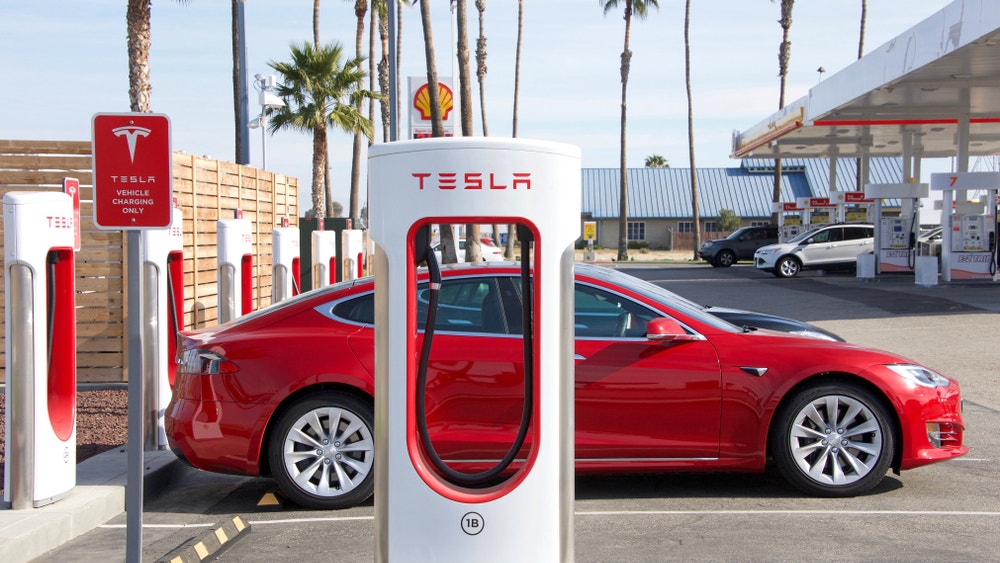That article gave no reason for me to believe these claims. Also that website is horrible.
Fluff piece for getting funding from suckers.
Interesting the major backer is Volkswagen who announced last week their brand is no longer competitive…so now they’re trying to get more value out of this investment by junk pieces like this.
It’s solid instead of liquid broski. QED.
Lots of companies have been saying they have solid state EV batteries for years, yet you still can’t buy one. Either they can’t figure out how to mass produce them cost effectively or there is some sort of problem with the battery.
I think toyota actually plans on getting there in the next few years. I think the current and final hurdle; which I’m guessing a couple different companies about have a complete handle on is the prevention of dendrites forming and causing the batteries to go bad from multiple charge cycles.
Toyota wouldn’t be blowing fluff about having the batteries a few years away from production if they weren’t confident about it happening. That’s reserved for saying something is 7 to 10 years away.
I think it’s more likely that Toyota dropped the ball on not investing in EVs early, so that they felt the need to announce they were working on some thing in hopes of staying relevant.
Toyota has been claiming to have EV-killing tech 3-5 years away for 20 years. It’s part of the plan for selling hybrids.
This, 100%
I mean…. Really? Toyota kind of kicked off the whole EV shebang by introducing the first commercially successful hybrid in the Prius. And they’ve been innovating in the space ever since. Don’t mistake this for me believing they have a solid state battery right around the corner. But Japanese auto companies aren’t known for being on the forefront. They’re known for doing what everyone else does with better reliability and lower costs.
Toyota have announced several times already that they’re “this close” 🤏 or only a few years away from releasing their first solid state battery EV…I’ll believe it when I see it.
Me too. And their revolutionary hydrogen car that everyone will turn to by the year yesterday
No they haven’t.
The same Toyota that declared that electric vehicles were a non-starter and that hydrogen vehicles were the future?
I think hydrogen will be in the future, but not for a while. Toyota is having to make lots of promises to make up for Kia and Hyundai eating their lunch.
That was several years ago when they wanted their developed hydrogen cars to get market and IMO, right now, they’re still right. All electric with current batteries are still no good. Range anxiety, charge issues, batteries that are huge and have to be built under the vehicles in a way that extremely expensive to replace 10 plus years down the line when they start going bad. It’s no good. Basically any car built that way in the sub $50,000 market will be worthless in around 15 years. Won’t be worth the battery replacement cost.
Right now, until batteries are better, like solid states are supposed to be, hybrids are the way to go. Smaller, cheaper, easier batteries to replace, still great gas mileage, and no range anxiety or charge location issues. All electric just isn’t realistic right now for most people. Now if you’re a home owner with a garage and get a new vehicle every 5 years and don’t need to take many long trips, or use a different vehicle for long trips, it could be great, but those people aren’t most people.
I’m privileged in that I live in perhaps the country with the densest coverage of EV infrastructure anywhere (except for maybe a microstate or two), but in the 7 months of driving an EV I’ve not once experienced range anxiety.
You can’t do huge roadtrips without a recharge every 250-350km in this relatively more affordable model, but for daily driving it’s like waking up with a full tank every day. If I visit friends 200km away, I just park at a destination charger and walk the last 200 meters.
At least right now that’s is a lot more viable than hydrogen. I can’t fill up in my town. I can fill up near my work 35m away. But it would a hassle.
I speak more of the US market. There are plenty of other countries where an ev with a 200km range would work great, but in the US dense cities that no one ever goes anywhere from all have people living in apartments that can’t charge at home and due to how expensive real estate there is, going to a rapid charge place and waiting there 30 minutes costs more than gasoline.
Then in the less dense places…well, I am a more extreme case, but my drive to work is 140 Km each way. The US is so huge and so many people at least have to occasionally drive do far, that a 200km vehicle just isn’t enough. Doubly so for colder areas/times when that range is drastically reduced.
I think hybrids need to be built like EVs with on board range extender generators. I believe the Volt was that way but if you had enough battery to cover 120 miles full EV with plug-in recharge most of the time it would be full EV. Long trip? Generator kicks on at mile 100 and takes you an absurd distance.
The latest Toyota hybrids are pretty great but they need competition. Sadly the Volt died.
Kia/Hyundai/Ford/Audi should make “Range extender” versions trading half the battery pack for generator and fuel weights to up the pressure.
Full EV might not be great for long trips, but full ICE is silly compared to a hybrid.
Make the F-150 standard truck get 40mpg on gasoline on trips, EV around town and you have a winner.
They already have those. They’re just called plug in hybrids. The prius plug in hybrid for instance, will go about 40 miles on electric only.
Toyota doesn’t make batteries, they make press releases - the purpose of which is to dissuade you from buying a BEV, in case you find out how good they are.
Here’s why I don’t buy it- Toyota is still hyping hydrogen as the next gen fuel option. They barely have a BEV option, despite having a 15-year lead on electric drivetrains.
They’re betting hard that BEVs are a small market.
If they kept systems as hybrids until better battery tech shows up, I still think that would be the best bet (for the US market, at least). Needing a 1500 pound battery that’s hard as hell to replace, costs usually over $5,000 just for the battery, and will slowly degrade with time until complete failure in 15 years or so seems like a right bad idea for a large amount of people. Smaller batteries in shorter range models isn’t good enough for trips away from town, and for the millions of people living in apartments, they have to charge away from home, which is often no cheaper than gasoline and takes longer. Hybrid systems are the sweet spot for now. No range anxiety, no plugging in, and no giant 1500 lb batteries, while the gas motors last ages because they aren’t working as hard. When my old prius battery went out after being around 13 years old, I bought a new one from toyota for $1900 and swapped it out in an afternoon.
I don’t think hydrogen will happen in the US. I think that’s also a fairly poor choice just because of how much power it takes to make the stuff and getting stations for hydrogen all across the country.
Why would any company sell batteries that need to be replaced less often? Companies are greedy as fuck and don’t care about consumers. It’s all about their bottom line. And if you’re not buying enough, often enough, than companies hate you.
If you prevent them from collusion and price fixing through regulation competition wi… ha lmfao I can’t even pretend.
For one, they could recoup the money they spent doing research by selling a bunch of new cars with the batteries.
Also, rechargeable batteries exist even though they also sell single use batteries.
Competition, it will take time, but consumers will over the next 20 years figure it out and cars with better batteries will.be worth more.
if someone had some new functional battery tech that lasted a decade, that person would be richer than all fuck. its all about volume, and youre forgetting just how tiny this planet has become with 8 billion humans on it.
you just dont understand scale at all
I’ll paye extra for a safer battery that lasts longer.
And that provide an output that doesn’t diminish as much in cold weather. EVs in the cold of nordic countries means a terrible mileage on a charge.
LiFePo batteries are pretty safe and last a long time. The just need a heated blanket for sub freezing to charge. There’s some videos showing puncture resistance/fire resistance between battery types. Neat stuff.
Will Prowse has one I think
Tell me once it’s on the market. Been reading about better battery technology for years, and nothing happens.
Battery capacity has tripled in the last decade
deleted by creator
you’re being downvoted, yet you’re absolutely right.
our current battery technology is shit compared to what a solid state battery would be.
of course there have been advancements but it’s still the same battery technology, just with bigger capacities.
it’s a perfectly good analogy.
deleted by creator
Yeah, I think I’ve lost track how many articles and youtube videos about amazing “solid state” batteries are just around the corner. But I’ve not seen one actually materialise.
I mean, it’s great if true. But, I’m going to wait and see.
There’s been a steady increase in lithium based technologies though. But I do wonder when and where the plateau there might be.
Lithium Ion based batteries have a lot of room to grow still.
Everything out there in cars today can likely still double or triple over the next couple decades.
Everyone says they want a 1000 mile car but they really don’t need it. We’ll reach an optimal price/battery range in a car and begin reducing the amount of batteries with our current tech before we’re selling cars with the full potential a decade or two from now.
And the increase in power density in LFP batteries will be a great thing given their cost, longevity and safety profile.
Wake me up when they’re being mass produced at cost effective rates.
subscribe 😴
And can dissipate heat efficiently in the same package size. The limitation to lipo/life/li-ion package density isn’t cell volume. It’s cell volume plus heat removal overhead. Making the cells smaller doesn’t actually change anything about the cooling overhead.
LMAO They are going to win!
They beat Tesla with their own weapons: empty promises!
/s
Maybe we need to have a completely-bullshit-venture-capital-investor-bait-technology community.
Yah and cold fusion is right around the corner.
Awesome I can use that to charge this new battery
You’ll want a Mr. Fusion for that.
So does this company actually HAVE a solid state battery or is this still all in concept?
Because we already know how amazing and good a solid state battery would be… When we finally get them. But the problem is actually getting them.
Unfortunately the article seems to be mostly talking about how good a solid state battery would be and not much at all on this startup actually having anything functional.
Removed by mod
Ah yes more “crushing” tech… High density and fast charging… Always means it’s only good for like 100 charge cycles so it’s effectively useless in reality.
from what i understand, solid state batteries are legitimately about as revolutionary as lithium ion were because they are all of those things, and by their very nature they have a huge number of charge cycles
… whether this specific announcement results in a mass-production-capable battery is another story
QuantumScape has been expected to produce something for a long time now, it isn’t new, the article didn’t mention timelines or production.
They where supposed to go intro production mid this year / next
https://www.nextbigfuture.com/2020/09/quantumscape-plans-1-gigawatt-hour-battery-plant-in-2024.html
Till we see them rolling off the factory line it is just vapor .
The Next Big Thing™ is always ~5 years away.
Battery news have been so fake every time. I won’t believe any more battery tech news until I see an actual device or vehicle powered by one.
We know solid-state batteries are good, we want someone to produce stable solid-state batteries cost-effectively.
Yes, I’m going to base my investment on large scale technology on finance.yaoo.com, or better yet benzinga.com!! Especially after their exclusive on “Analyst Inside Look: Trends And Opportunities In Ohio’s Emerging Recreational Cannabis Sector”
But this battery CRUSHES it! That’s more than SLAMS!!!
I keep reading batterie breakthroughs that change the world for decades now.
First of all, their claims are not new. They claim this for a long time already but have not shown a minimal viable product yet. During the time they spend money in research, Tesla batteries grew to 3 times the originals.
QuantumScape have only shown minuscule batteries, they need to scale up to car battery capacity. Only a car with their battery can prove their claims. Until that happens their stories are worth nothing.
Charging a 75kWh large car battery in 15 minutes requires a charger of at least 300.000W. Imagine a charging station for 5 cars would need a 1.5MW power station. That is impractical. Also the current flowing into the car would be enormously high, requiring huge cables. Also inside the battery pack, huge cooling systems are required.
More practical solutions are exchanging battery packs or battery fluid exchange (flow battery). In short time 100% recharge and virtually unlimited range if packs are slowly charged at exchange hubs. .
QuantumScape will water down their claims and eventually publish a more or less standard LiFePo battery if the investors are lucky.
Thanks for your insightful comment.
Regarding 300kW charging: I thought new EVs already charge with up to 180kW DC (?), so this would “only” be a doubling in performance?




















